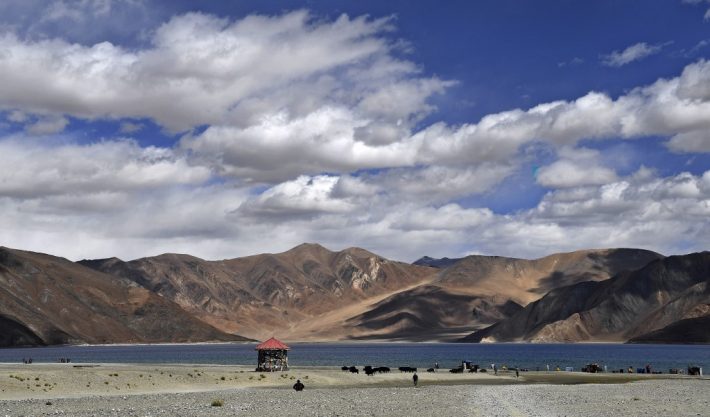India and China have agreed to a deal on patrols of their disputed frontier in the western Himalayas to end a four-year military stand-off.
The news – announced by the Indian foreign minister said on Monday and confirmed by China’s foreign ministry on Tuesday – could lead to improved political and business ties.
The news came on the eve of Indian Prime Minister Narendra Modi’s visit to Russia for an October 22-24 summit of the BRICS regional grouping, during which he could hold talks with Chinese President Xi Jinping, Indian officials said.
ALSO SEE: At COP16, Officials Push to Align Nature And Climate Goals
Relations between the world’s two most populous nations – both nuclear powers – have been strained since clashes between their troops in mid-2020 on the largely undemarcated frontier left 20 Indian and four Chinese soldiers dead.
The two sides had since stopped patrolling several points along the border in the Ladakh region to avoid new confrontations, while moving tens of thousands of new troops and military equipment closer to the freezing highlands.
“We reached an agreement on patrolling, and with that we have gone back to where the situation was in 2020 and we can say … the disengagement process with China has been completed,” Indian Foreign Minister Subrahmanyam Jaishankar said at a NDTV media conclave.
The “understanding was reached only today,” he said, adding: “We always said that if you disturb the peace and tranquillity how can the rest of the relationship go forward?”
To avoid clashes, the two militaries will patrol contested points along the border according to an agreed schedule, a senior Indian military officer aware of the details told Reuters.
Both sides will monitor the area in Ladakh to ensure that there are no violations, the officer added.
China’s foreign ministry in Beijing confirmed the agreement on Tuesday.
“Over a recent period, China and India have been in close communication through diplomatic and military channels on issues related to the China-India border,” Foreign Ministry spokesperson Lin Jian told a media briefing in Beijing.
Now, the two sides have reached a resolution on the “relevant matters,” he said, adding that China would work with India to implement it, but declined to provide details.
Modi could meet Xi at BRICS summit in Russia
Officials in New Delhi said the pact clears the path for a likely bilateral meeting between Modi and Xi on the sidelines of the BRICS summit in Kazan, Russia, which will be their first since 2020.
The senior military officer said that both sides would pull back their troops a little from current positions to avoid face-offs, but would be allowed to patrol these areas according to a schedule that is being worked out.
Monthly review meetings and regular monitoring of the contested areas by both sides would ensure there are no violations, he added.
Deependra Singh Hooda, a retired senior Indian army officer who was a commander for a part of the China frontier, said that while the two sides would need fresh confidence-building measures, “at least the impasse has been broken”.
Slow progress during talks over the last four years to end the stand-off damaged business ties between the two large economies, with New Delhi tightening scrutiny of investment by Chinese firms and halting major projects.
India’s tougher vetting of all Chinese investment after the clashes effectively turned away billions of dollars from the likes of carmakers BYD and Great Wall Motor, and added more red tape in Indian firms’ interactions with Chinese stakeholders.
However, Indian imports from China have surged 56% since the 2020 border clash, nearly doubling New Delhi’s trade deficit with Beijing to $85 billion. China remains India’s biggest source of goods and was its largest supplier of industrial products last year.
Asked about the impact of Monday’s pact on trade with and investment from China, Jaishankar said: “It has just happened. There will be meetings to see what the next steps will be. I wouldn’t go so fast.”
- Reuters with additional editing by Jim Pollard
ALSO SEE:
India Refusing to Restart Direct Passenger Flights With China
India’s Close Scrutiny of China Firms Worries Suppliers: Xiaomi
India to Discourage Foreign Trade Settlement in Chinese Yuan
India to ‘Urgently’ Ban China-Linked Betting and Loan Apps
India, US Partner on Chips, AI and Arms to Take on China
India’s TikTok Ban ‘Incredibly Important’: US FCC – TechCrunch
Wang Yi Seeks Normal India Ties, Delhi says Ease Border Row First
India bans 118 more Chinese apps in repeat crackdown
India, China Hold Talks to Cool Deadly Border Tensions
























